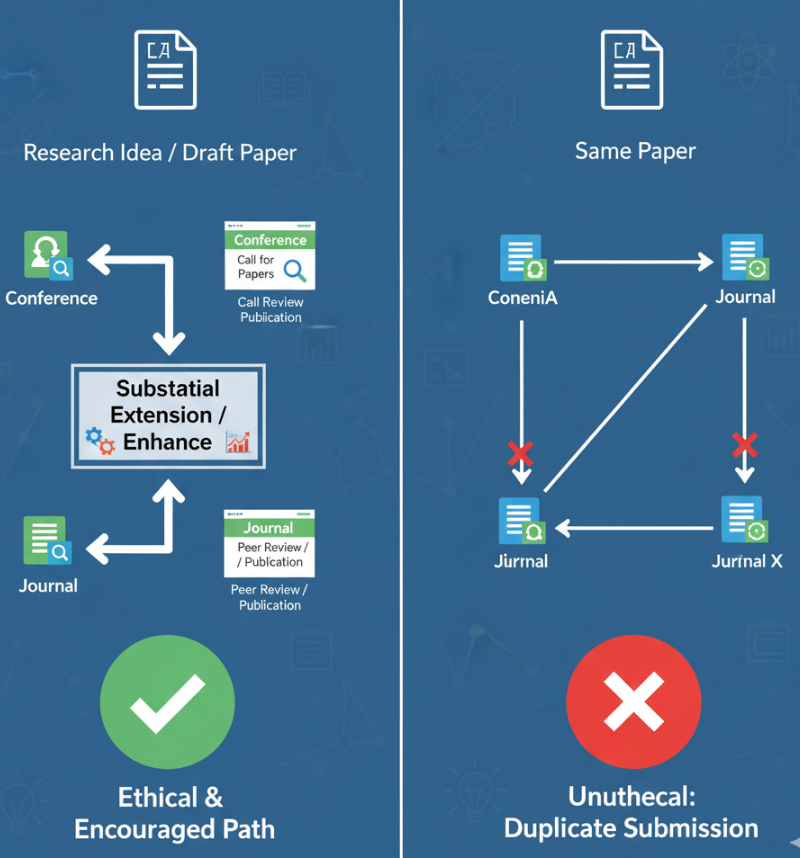

391 views||Release time: Sep 08, 2025
The question, "Can you submit a conference paper?" seems simple, but it touches on some of the most critical rules in academic publishing. The short answer is yes, submitting papers to academic conferences is the primary way research is shared and discussed. However, the real question for many researchers is what you can do with that paper after the conference.
Can you submit it to a journal? Can you present it elsewhere? Understanding the ethical guidelines is essential for building a strong academic career. This guide breaks down the rules of submission, from the initial conference draft to a full journal article.

First, let's be clear: the entire purpose of an academic conference is for researchers to submit their work for presentation and publication. The typical process is:
Find a Conference: You identify a conference relevant to your field.
Read the Call for Papers (CFP): This document outlines the scope, formatting requirements, and submission deadline.
Write and Submit: You prepare your manuscript and submit it through an online portal before the deadline.
Peer Review: Experts in your field anonymously review your paper.
Receive a Decision: Your paper is accepted, rejected, or accepted with required revisions.
Register and Present: If accepted, at least one author registers for the conference and presents the work, usually as an oral or poster presentation.
Given the current date (September 8, 2025), now is the prime season for submitting papers to conferences scheduled for the spring and summer of 2026.
This is where the most important rules of academic ethics come into play. Here are the two "golden rules" every researcher must follow.
It is a serious breach of academic ethics to submit the same or a very similar paper to more than one venue at the same time. This means you cannot:
Submit the same paper to two different conferences simultaneously.
Submit the same paper to a conference and a journal simultaneously.
This practice, known as "duplicate submission," is considered unethical because it wastes the valuable time of volunteer reviewers and can lead to copyright issues. If caught, your paper will be rejected from all venues, and your academic reputation could be damaged.
It is a common and highly encouraged practice to develop your conference paper into a more comprehensive journal article after it has been presented at the conference. Journals recognize that a conference paper is often a preliminary report of novel research. They welcome submissions that are a substantially extended version of this initial work.
You cannot simply submit the exact same conference paper to a journal. The journal version must offer significant new material. While there is no universal standard, a widely accepted rule of thumb is that the journal version should contain at least 30% new content.
This "new content" can include:
More in-depth theoretical analysis or a more detailed explanation of the model.
Additional experiments, case studies, or data sets that strengthen your conclusions.
A more comprehensive literature review and deeper engagement with related work.
Expanded discussion of the results, limitations, and future research directions.
Crucially, when you submit the extended version to a journal, you must cite your original conference paper and clearly state in your cover letter and/or introduction that the submission is an extended version of the conference work.
| Action | Is It Allowed? | Explanation |
| Submit an original paper to one academic conference. | ✅ Yes | This is the standard and correct procedure. |
| Substantially extend a published conference paper and submit it to a journal. | ✅ Yes | This is a common and encouraged practice for developing your research. |
| Submit the same paper to Conference A and Conference B at the same time. | ❌ Absolutely Not | This is duplicate submission and a serious ethical violation. |
| Submit the same paper to a conference and a journal at the same time. | ❌ Absolutely Not | This is also considered duplicate submission. |
| Submit a published conference paper to a journal with no changes. | ❌ Absolutely Not | This is considered self-plagiarism or redundant publication. |
Conclusion:
Submitting your research to academic conferences is a fundamental part of being a researcher. By adhering to these ethical guidelines—avoiding duplicate submissions and ensuring any subsequent journal articles are substantially extended—you can confidently share your work, build your reputation, and contribute valuable knowledge to your field.